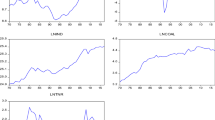Abstract—
The presented study of patterns of changes in specific (per capita) electricity consumption (SEC) in developed and developing countries, as well as in Russian regions, demonstrates that Russia does not have preconditions for electricity consumption growth to over 1400 bn kWh under the high scenario of the demographic forecast and to over 1300 bn kWh under the medium scenario. While differences between SECs in developed and developing countries have been decreasing since the 1960s, SEC differentiation among Russian regions is increasing. The conclusion reached using tools of the technocenosis theory is that efforts should be focused not on electricity consumption growth in regions with high energy supply (those specializing in mineral production and metallurgy), but on increasing SEC in outsider regions. The problem of reducing differences in SEC between Russian regions is important for the structural stability of the national economy as a system.





Similar content being viewed by others
Notes
Energy Efficiency: California`s Highest–Priority Resource. August 2008.
REFERENCES
E. P. Velikhov, “Energy in the world economy of the 21st century,” Tr. Mosk. Fiz.-Tekh. Inst. 3 (4), 6–15 (2011).
V. V. Bushuev, Energy Potential and Sustainable Development (IATs Energiya, Moscow, 2006) [in Russian].
E. P. Velikhov et al., Evolution of energy in the 21st century,” Energ.: Ekon. Tekh. Ekol., No. 11, pp. 2–13 (2009).
V. R. Okorokov, I. O. Volkova, and R. V. Okorokov, “Intelligent energy systems: Technical capabilities and efficiency,” Akad. Energet., No. 3, 74–82 (2010).
V. Kondrat’ev, “Reshoring as a form of reindustrialization,” Mirovaya Ekon. Mezhdunar. Otnosheniya 61 (9), 54–65 (2017).
S. S. Gubanov, “Neoindustrial paradigm of development: Foundations and significance,” in New Industrialization of Russia: Strategic Priorities of the Country and Capabilities of the Urals (Ural. Gos. Ekon. Univ., Yekaterinburg, 2018), pp. 27–61 [in Russian].
The Boston Consulting Group. Made in America Again, Why Manufacturing Will Return to the USA (2011). https://www.bcg.com/documents/file84471.pdf.
S. A. Nekrasov and I. S. Shevchenko, “An alternative approach to determining the required electricity production in the Russian Federation,” Energet. Tatarstana, No. 1, 50–56 (2011).
S. A. Nekrasov and I. D. Grachev, “Renewable energy: Prospects for energy development correction in Russia,” Stud. Russ. Econ. Dev. 31, 71–78 (2020).
Energy Efficiency and Beyond. Toronto’s Sustainable Energy Plan (2007). http://www.toronto.ca/legdocs/ mmis/2007/pe/bgrd/backgroundfile-4989.pdf.
N. S. Simonov, The Onset of the Electric Power Industry of the Russian Empire and the USSR as a Problem of the Technocenosis (Infra-Inzheneriya, Moscow, 2017).
A. N. Kuz’minov, “Regional sustainability management: A cenological model,” Ekon. Reg. 7 (2), 28–32 (2009).
A. N. Kuz’minov, “Cenological features of regional market modeling as a resource allocation mechanism,” Ekon. Vestn. Rostov. Gos. Univ. 5 (4), 127–131 (2007).
V. V. Fufaev, Economic Cenoses of Organizations (Tsentr Sist. Issled., Abakan, 2006).
B. I. Kudrin, “Classics of technical cenoses. General and applied cenology,” in Coenotic Studies (Tsentr Sist. Issled., Tomsk, 2006), Vol. 31 [in Russian].
V. I. Gnatyuk, The Law of Optimal Construction of Technocenoses (Tsentr Sist. Issled., Moscow, 2005) [in Russian].
“Electricity: The annual rating of Russian regions by electricity consumption for 1990–1999,” Elektrika, No. 6, 3–12 (2001).
B. I. Kudrin, “Energy efficiency: Rating of Russian regions by electricity consumption for 1990–2010,” Elektrika, No. 8, 3–15 (2010).
A. A. Bogdanov, in Tectology: (General Organizational Science), Ed. by L. I. Abalkin (Ekonomika, Moscow, 1989) [in Russian].
Author information
Authors and Affiliations
Corresponding author
Additional information
Translated by A. Ovchinnikova
Rights and permissions
About this article
Cite this article
Nekrasov, S.A. Tools of the Technocenosis Theory for Forecasting Electricity Consumption in Russia. Stud. Russ. Econ. Dev. 32, 263–273 (2021). https://doi.org/10.1134/S1075700721030102
Received:
Revised:
Accepted:
Published:
Issue Date:
DOI: https://doi.org/10.1134/S1075700721030102




